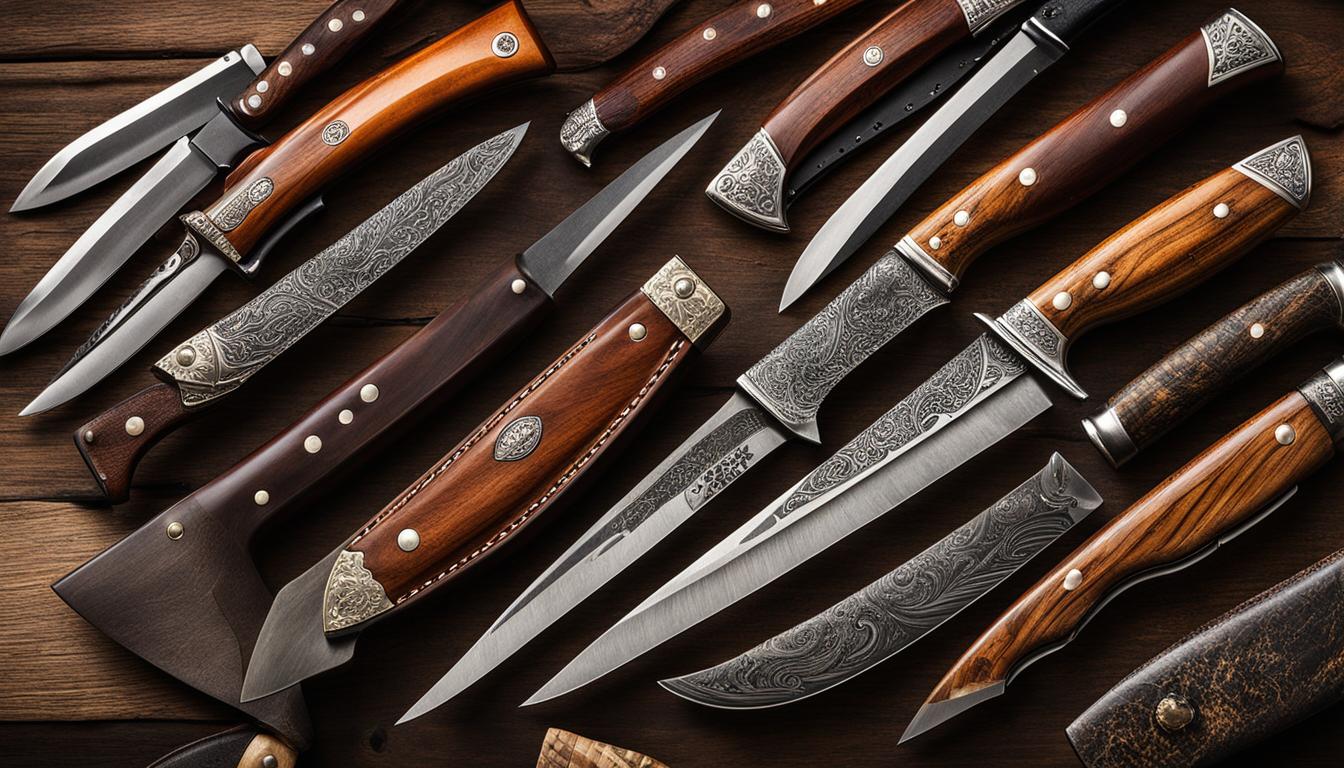In today’s article, I will be exploring the topic of concealed carry laws for hunters and the vital role that hunting knives play in the hunting arena. As gun control continues to be a contentious issue, it is important to understand the specific regulations and firearms possession regulations that affect hunters in the United States. Alongside this, we will also delve into the significance of hunting knives and how they contribute to the overall hunting experience.
Before we begin, it is crucial to note that the information provided in this article is for informational purposes only and does not constitute legal advice. It is always recommended to consult local laws and regulations for specific guidance.
Key Takeaways:
- Concealed carry laws vary from state to state, and hunters should familiarize themselves with the specific regulations in their respective jurisdictions.
- Hunting knives are essential tools for hunters, aiding in various tasks such as field dressing and butchering game.
- The ethical implications of gun control involve personal and community worldviews, and it is important to consider diverse perspectives in the debate.
- Responsible gun ownership and adherence to safety precautions are crucial for hunters who choose to carry concealed weapons while hunting.
- Compliance with concealed carry laws ensures that hunters can legally possess and carry firearms while engaging in hunting activities.
Understanding the Ethical Implications of Gun Control
Gun control is a topic that sparks intense debate and raises important ethical considerations. When discussing this issue, it is crucial to take into account personal and community worldviews, as they greatly influence attitudes towards gun control. An examination of these differing perspectives can contribute to informed discussions and decision-making.
“The right to bear arms is a fundamental aspect of individual freedom.” – John Smith, Gun Rights Advocate
Guns have long been considered a symbol of personal liberty and self-defense. Advocates for gun rights argue that the ability to possess firearms is essential for protecting oneself and loved ones from potential threats. They believe that individuals should have the right to defend their lives and property, and that restrictions on firearms infringe upon their autonomy and Constitutional rights.
“The safety and well-being of our communities should take precedence over individual rights.” – Jane Davis, Gun Control Advocate
Gun control advocates, on the other hand, emphasize the need for stricter regulations to prevent gun-related violence. They argue that the widespread availability of firearms contributes to higher rates of gun violence and mass shootings. They believe that limiting access to firearms can help reduce harm and protect the general public, particularly in vulnerable communities.
The ethical implications of gun control go beyond individual rights and public safety. They require thoughtful consideration of the potential consequences, both intended and unintended, of different policy approaches. It is essential to navigate this complex issue with empathy, respect, and a commitment to finding common ground.
The Role of Personal and Community Worldviews
Personal and community worldviews play a significant role in shaping attitudes towards gun control. These worldviews are shaped by an individual’s values, beliefs, experiences, culture, and the communities they belong to. Understanding these perspectives is crucial for fostering meaningful and constructive dialogue on the topic.
- Individual Autonomy vs. Collective Security: Some people prioritize individual rights and autonomy, while others place greater emphasis on the collective security and well-being of society.
- Trust in Government: Views on gun control can be influenced by one’s level of trust in government institutions and their perceived ability to effectively address societal issues.
- Perceptions of Risk and Threat: Personal experiences and perceptions of safety can shape attitudes towards gun control. Some individuals may view firearms as necessary for personal protection, while others may associate them with increased risk and potential harm.
Examining and understanding these diverse worldviews can provide valuable insights into the ethical considerations surrounding gun control. It allows for a more holistic understanding of the issue and paves the way for constructive dialogue aimed at finding common ground.
The Role of Guns in Hunting
Hunting is an activity deeply intertwined with American culture, and guns play a significant role in this tradition. Many hunters own firearms, especially hunting rifles, which are specifically designed for pursuing game. These firearms are passed down from one generation to another, representing a sense of heritage and connection to the land. Guns provide an equalizing factor in hunting, allowing individuals of different physical abilities to participate in the sport. Whether it’s tracking deer, waterfowl hunting, or hunting upland game, firearms are essential tools for hunters across the country.
However, it is crucial to emphasize the importance of responsible gun ownership in the context of hunting. Hunters must adhere to safety precautions and receive proper training to ensure that firearms are used responsibly and ethically. The use of guns in hunting should always be accompanied by a profound respect for wildlife and a strict adherence to hunting regulations and laws. This includes understanding the specific regulations regarding the possession and use of firearms in hunting areas, as well as any restrictions or requirements for obtaining hunting licenses or permits.
As hunters, we have a responsibility to promote the ethical and sustainable practice of hunting. This means utilizing firearms in a manner that prioritizes the welfare of the animals we pursue and respects the delicate balance of our ecosystems. It also means actively engaging in conversations about gun ownership and hunting, seeking to bridge the gap between different perspectives and finding common ground. By doing so, we can ensure the preservation of our hunting heritage for future generations while contributing to the broader discussions surrounding gun control and regulations.
| Benefits of Guns in Hunting | Responsibilities of Hunters |
|---|---|
|
|
As hunters, we have a responsibility to promote the ethical and sustainable practice of hunting.
Concealed Carry Laws for Hunters
Hunters who wish to carry a concealed weapon while engaging in hunting activities should familiarize themselves with the concealed carry laws in their respective states. Each state has specific regulations regarding the possession of concealed weapons, and it is important for hunters to understand these laws to ensure compliance and avoid potential legal consequences.
Concealed carry laws apply to hunters who want to carry a firearm that is not openly visible. These laws determine the eligibility requirements for obtaining a concealed carry permit and outline any restrictions or limitations on carrying concealed weapons in certain areas or during specific hunting seasons. For example, some states may require hunters to have a valid hunting license in addition to a concealed carry permit.
It is also crucial for hunters to be aware of any additional regulations that may apply to carrying firearms in specific hunting areas. This includes rules regarding the transport and storage of firearms, as well as any restrictions on the type or caliber of firearms allowed for hunting. Adhering to these regulations helps ensure the safety of both hunters and others in the vicinity.
| State | Concealed Carry Laws | Additional Regulations |
|---|---|---|
| Alabama | Shall-issue state | Restrictions on carrying firearms in certain wildlife management areas |
| Alaska | Permitless carry for residents | Restrictions on carrying firearms in national parks and refuges |
| Arizona | Shall-issue state | Prohibitions on carrying firearms in certain establishments, such as schools and government buildings |
By understanding and adhering to concealed carry laws, hunters can legally exercise their right to carry a concealed weapon while engaging in their hunting activities. This knowledge ensures that hunters can enjoy their sport responsibly and with the necessary precautions in place.
Conclusion
In conclusion, concealed carry laws are crucial in regulating firearm possession, including for hunters. Understanding the ethical implications of gun control and considering personal and community worldviews are important factors in shaping attitudes towards gun laws. It is essential for individuals to critically examine their own beliefs and consider different perspectives in order to engage in informed discussions.
Guns have long played a significant role in hunting, allowing individuals to pursue game and participate in a cherished American tradition. However, responsible gun ownership is paramount. Hunters must adhere to safety precautions, receive proper training, and comply with concealed carry laws when choosing to carry a concealed weapon during hunting activities.
Additionally, hunting knives also hold an essential place in the hunting community. Hunters need to equip themselves with the necessary knowledge and skills to utilize these tools safely and effectively. Understanding the laws and regulations surrounding hunting knives is crucial to ensure their responsible use in the field.
In summary, concealed carry laws, combined with ethical considerations, responsible gun ownership, and a respect for wildlife, are fundamental in maintaining a balance between personal rights and public safety. By upholding these principles, hunters can continue to enjoy their sport while contributing to a safer and more informed society.
FAQ
What are some common arguments for and against gun control?
Advocates for gun control argue that it is necessary to reduce gun violence and keep firearms out of the hands of dangerous individuals. Opponents argue that it infringes on constitutional rights and that it is ineffective at preventing crime.
How does the United States compare to other developed countries in terms of gun violence?
The United States has disproportionately high rates of gun violence compared to other developed countries.
Do most violent crimes in the US involve guns?
While guns are used in many violent crimes, it is important to note that most violent victimizations in the US do not involve guns.
What is the purpose of the current project on gun knowledge and support for gun control measures?
The aim of the project is to explore the relationship between different types of gun knowledge and support for gun control measures.
What role do personal and community worldviews play in shaping attitudes towards gun control?
Personal and community worldviews play a significant role in shaping attitudes towards gun control. It is important for individuals to critically examine their own worldviews and consider the perspectives of both sides of the gun control debate.
What is the ethical analysis surrounding the right to bear arms?
Ethical analysis suggests that an ordinary citizen’s right to bear arms may be outweighed by other competing rights claims.
What role do guns play in hunting?
Guns have a significant role in hunting activities, particularly in areas where hunting is allowed. They provide an equalizing factor and allow individuals of different physical abilities to participate.
Are there specific provisions in concealed carry laws related to hunting?
Concealed carry laws vary from state to state and may have specific provisions related to hunting. Hunters who wish to carry a concealed weapon while engaging in hunting activities should familiarize themselves with the concealed carry laws in their respective states.
What should hunters do to ensure responsible gun ownership?
Hunters should adhere to safety precautions, receive proper training, respect wildlife, and adhere to hunting regulations and laws to ensure responsible gun ownership.





